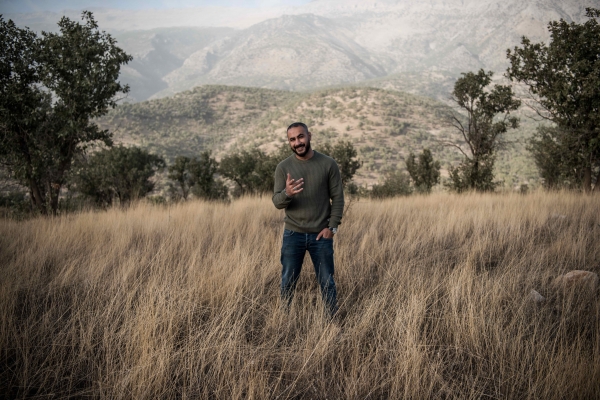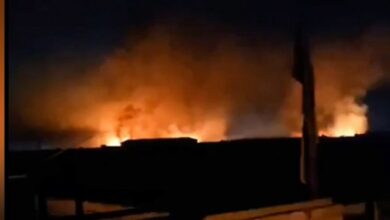
It was past 10:00 on a Friday night, and the party was in full swing. Hundreds of young men and women had come to Baghdad’s swanky Ishtar Hotel, leaving the dusty, grimy city at the doorstep to mingle at the elegant outdoor pool. Sipping nonalcoholic drinks and straining their voices to overcome music blasting from a sound system, their chatter was suddenly interrupted by a group of men who burst onto the patio, assault rifles clattering by their sides.
Without explanation, they arrested around a dozen partygoers, dragging them along as they left almost as swiftly as they had appeared. Among those whisked away was Arshad Fakhry. The 31-year-old had organized the pool party, the latest in a series of events that had earned him the reputation as Baghdad’s party king.
Most of those arrested were released on the streets outside the hotel. But Fakhry and another man, a nephew of a government minister, were bungled into a car and driven away. According to Fakhry’s brother Amjad, the minister’s nephew was released two days later, delivered to his uncle’s office blindfolded. Fakhry, who has no powerful relatives to fall back on, vanished without a trace.
Iraq’s militias and forced disappearances
His family is desperate to find out what happened after his kidnapping on November 20. For weeks, they have pleaded for information with government officials and worked their extensive network of relatives and friends in Baghdad. Their efforts have been met by a wall of silence.
But that silence carries its own message. In Iraq, forced disappearances are common. Most are carried out by shadowy militia groups collectively known as the Hashed al Shaabi. They have the muscle and influence to make almost anyone disappear and inspire the kind of fear that stops people from speaking out.
“We are told that he is not with the secret service. Yesterday I heard from a relative that he might be held by Hashed Intelligence. But we don’t know for sure. We don’t even know if he is alive or dead,” says Amjad.
Prime Minster Mustafa al-Kadhimi earlier this year pledged to crack down on forced disappearances. Fakhri’s kidnapping suggests that little has changed, even though the Hashed are officially part of Iraq’s security forces.
“The reality is that the prime minister of Iraq is not actually in command control of most of the forces that sit under him on paper, and that includes the Popular Mobilization Forces,” says Belkis Wille, a senior researcher at Human Rights Watch.
The Hashed, also called Popular Mobilization Forces by Western observers, are predominantly Shia armed groups that grew in size and number during the war on the Islamic State group (IS). After the Iraq military crumbled under the IS onslaught, the militias played a crucial role in defeating the terror group. Many were formed during the years of insurgency and sectarian strife that followed the US-led invasion in 2003, and have strong ties to neighboring Iran. Victory over IS has left them more powerful than ever.
Like their vanquished foes, many are religious fundamentalists that take their cues from Tehran’s mullahs. Their piety has not prevented them from taking part in the plunder of Iraq’s resources through graft or force. When Iraq’s youth took to the streets last year to protest government corruption and an economy that offered them few prospects, the Hashed joined security forces in gunning down hundreds of peaceful protesters.
“The Popular Mobilization Forces are playing a very dominant role in repressing a wave of demands for liberalization, for accepting different lifestyles, different views. That includes forcibly disappearing people but that also includes carrying out extrajudicial killings and threats,” says Belkis Wille.
Bringing culture from abroad to Iraq
Organizing parties where men and women mixed freely to the sound of Western music, Fakhri was a thorn in the side of these groups. Before long, anonymous threat started pouring in.
“He was threatened a lot before this party. He was holding these events, pushing something new, he was really successful. They got irritated,” says a friend of Fakhry who does not want to be identified.
Fakhri was not intimidated. In videos published by Riot Gear, the event company that he founded, revelers are seen dancing to DJ sets featuring the latest rap anthems, and to the tunes of local rock and hip hop bands performing on stage.
“Arshad wanted to bring culture from abroad to Iraq,” says his brother Amjad. Baghdad’s cool kids lapped it up.
A fluent English speaker, Fakhri was exposed to outside influences long before he ventured into the party business. During the war on IS, he worked with foreign journalists, organizing interviews and visits to the front lines. During the grueling, months-long battle for the city of Mosul, he drove reporters to the war zone in his flashy Mustang sports car, speeding over pockmarked roads and past bombed out buildings.
His love for fast — and loud — cars found expression in Riot Gear, originally founded to organize drifting contests, where drivers shred their wheels as they spin their cars over the tarmac. To raise money for children affected by the fighting, Fakhri organized one such contest outside Mosul. It had to be abandoned when IS attacked the event with drones.
With the terror group defeated, liberal-minded Iraqis like Fakhri face a different kind of threat.
“For us young people, the biggest problem is the lack of freedom. The Iran-aligned militias and the government control everything,” says Amjad.
By Florian Neuhof




